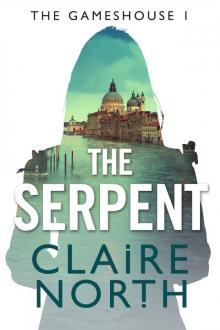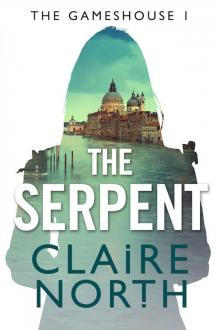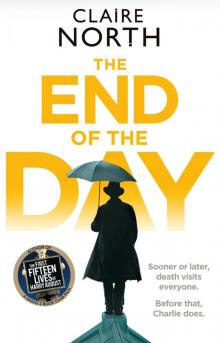- Home
- Claire North
The Serpent Page 3
The Serpent Read online
Page 3
His hair is grey, his beard is long and, as only the old and the great do, he wears a gown even in summer which reaches to his ankles, and a chain of gold about his neck, and a purple cap upon his skull, and his most prized possession is a brooch of golden fleece given to him, so the rumour says, by a Spanish king for some service against the Turk in a battle long since fought, long since forgotten.
Or perhaps he bought it second-hand. Who can say, with a man like Seluda?
His voice now, meeting hers.
- I did not expect a woman, he says.
- Nevertheless.
- Can you play?
- I would not have been chosen if I couldn’t.
- The notion of putting my fate in the hand of a woman disquiets me. I was promised assistance from the Gameshouse in exchange for some…services. When I agreed to these terms, I had imagined more than this.
- You will find I am very suited to the task.
- May I see your face at least?
- No.
- Or know your name?
- Not that either.
- I am fighting for election to the Supreme Tribune. If I should win, I will command the Council of Forty in all but name, and what’s in a name when so much power is at stake? If I command the Council of Forty, I will rule the city beyond the power of any mere Doge. I know what my rewards are and how much is staked. What do you get and why do you care?
- I win the game.
- This isn’t a game.
- Isn’t it? There are rules, boundaries, constraints on your action. Clear goals, tools to achieve them, a set table of rivals who must obey the same rules that you do if they wish to reach the same end. The only difference between these events now unfolding and any other game is the scale of the board.
- Games should be enjoyable.
- Levity and sincerity are not antonyms. We take pleasure in playing chess, but that does not mean we make wasteful moves. You have invested things of great weight into these coming events. Your honour, your prestige, your finances, the welfare of your family, your business, your servants, your future. Such matters can weigh heavy on a mind and cloud it to wisest judgement. I suggest that having the assistance and resources I offer, untainted as they are, will be of service to you.
Seluda is silent a while. Then
- What do you need?
Chapter 11
She takes a room in the top of his palazzo.
The mask will not leave her face now, save for in those few, few moments when she is alone, high above the waters of the city.
She needs pen, paper.
The rest she can do for herself.
A servant of Seluda is sent to the Doge’s palace with orders to wait and not move a muscle until he has heard who else will stand for the Supreme Tribunal. In all, seven names are called. She studies them, trawling through memories and faces, esteemed gentlemen half known from prayers at church or whispers on the wharves. Who of these seven are serious contenders, has something to gain? She draws circles around four names, including Seluda’s, but nothing is to be taken for granted yet. Each party must be assessed, their business known, for even a minor rival who cannot win the prize on his own part may yet disrupt her activities in bidding for it.
She expects Belligno to run, and indeed his name is one of the first that reaches her ears. Whether Belligno has decided to campaign for his own gain or because he hears Seluda too seeks the prize, she is not certain, but she pays a beggar and his daughter to observe all that Belligno does and report on those he is seen with, rumours that are uttered about his name. For two days they watch, and at the end of the second day there is still no sign that anyone plays Belligno, save himself.
Faliere – jovial, smiling Faliere, who it is said prepared the poison himself that killed three of his guests at a feast some seven years ago, though equally it could have been a bad fish or a rotten egg. How can a man who smiles so boldly and laughs with such hearty appreciation of others be a poisoner? And then she looks a little closer and thinks perhaps he laughs as he prepares the brew? Perhaps, like a child making mud pies, he chuckles to himself as he stirs belladonna into his enemy’s wine, chortling at the thought of their eyes widening, their hearts racing, their minds clouded and tongues hysterical? Perhaps this same thought keeps him merry as he serves drink, and people mistake this continual self-entertainment with being a more generous spirit and think his humour is at their wit rather than his own?
Or perhaps he never poisoned anyone and knows that it is good to be both loved and feared, and so laughs and is generous to his friends and lets the rumours persist of what he may do to his enemies?
Paolo Tiapolo and Andrea Contarini are not only both strong candidates, but have the gall to attend mass together. She sits at the back of the church and observes them, on opposite sides of the aisle. They smile at each other, embrace as old friends: - Paolo, Paolo, so good to see you; - Andrea, your wife looks beautiful and I hear all is well with you? – and when the other’s back is turned they bend down and whisper to their wives and their secret companions, - There goes that bastard. Watch him – he’s a snake…
Tiapolo has three daughters whom he has kept virginal and unmarried for an unfashionably long period of time. The eldest is nearly twenty-four and people are already questioning if the old maid is even capable of bearing children but now! Ah – clever now, clever Tiapolo, we understand! You were waiting for Brabano to die; you were waiting for the time as well as the place when each child might be most helpfully deployed in your cause. Well prepared, Tiapolo, well did you play the game, even before the game was begun.
And Contarini? He has quarries on both this and the other side of the Adriatic Sea; his business is mortar, stone, brick, clay and those judicious men who have mastered all of the above. His children are long since married to wagon masters and marble merchants, so barely a building can be raised in the city now without the Contarini’s mark etched above the door. Foolish men mistake the master for his trade, call Contarini “Old Man Stone” and say his wit is dull and heavy as the slabs of the coffin – yet how they change their tune, these laughing men, when they want an extension added to the top of their palazzos or repairs done to the inside of their wells! How then they flock to him, our master Contarini, and laugh at his jokes which are, we will concede, exceptionally dull and surprisingly crude, made only marginally funny by the hope of discounts gained through humour shared.
These two – smiling Tiapolo and leaden Contarini – are rivals indeed, though each in their different way, and as she watches them bow before the bishops, she wonders what they make of her piece, or if they think of him at all.
A flash of colour in the church, a smile caught in the corner of her eye. She looks, and then looks harder, astonished by what she sees. Puffed sleeves of cyan-blue, rings of silver and gold, and features familiar, manner known. Whoever is playing Tiapolo as their piece doesn’t bother to hide. He sits, proud as Zeus, directly behind his piece, his pawn, his king – whatever it is you may call these would-be masters of all they survey. He does not wear his mask in church, for to do so would be and offence to the Lord and the great servants of the Lord gathered there, but step outside and he wears it, a badge of prestige and power. It is not he himself who hides behind that carved smile and gold-rimmed eyes; no, rather it is he – himself, the great man, the player – that he wears instead of his face: lord of his dominion, master of the game.
She watches him; she watches Tiapolo. She fears the piece more than the player.
Though he has appeared at mass, he vanishes by private barge, and for two days after she cannot find Contarini. He has moved, he is hidden, but let that not be seen as a sign of weakness, for when he needs to appear in the Doge’s palace, he is there, shaking hands, and when he leaves he does so by two private boats, one which turns left, the other right into the bay, and no man can know which of the hooded men that sit within it is the man himself. Contarini fears the blade of an assassin and his fear perhaps tells us the
direction in which he too shall take this game. She makes no effort to track either of his gondolas. Assassins are crude tools and should only be played when the board has coalesced into something more coherent. Contarini will wait.
At night, she lines the pieces up on her table. Faliere, Tiapolo, Contarini, Seluda. Do the other players study these as she does? Are they sitting alone with a single half-burned candle considering their enemies, their friends?
(And now we see! Three unnamed rivals spread across the Venetian night. He, the one who is proud, so proud of his cleverness and his power, so rich on the satisfaction of his game, so aloof from humanity – he drinks at the high table with Tiapolo, and will go to bed drunk and wake late, and tell strangers that he has slept with Tiapolo’s wife, knowing no one will question him, and thinking it is because they are afraid.
And he, who plays for Contarini, or on Contarini, depending how you look at the matter, watches the house of Seluda where even now Thene resides, and knows that his piece is a powerful man, and will not be happy until this rival is removed, and he feels the weight of a silver box given to him in the Gameshouse, and knows the power therein and wonders whether soon is too late to strike.
And for the last?
Why, like Thene herself, he sits alone in the shadows and considers his move.)
Faliere, Tiapolo, Contarini, Seluda.
And beneath them, a question. Why was Belligno not chosen as a piece? Why is she not playing him in this game of power and politics? His claim to the position on the Supreme Tribunal is strong, perhaps stronger than Seluda’s own. Why is he not being deployed and moreover, will he be a threat, though he is neither player nor played?
Questions in the night. We shall leave her with them for her bedside company.
Chapter 12
Let us consider a card.
Its frontage shows the Seven of Staves, but who is he?
A man who has struggled to the top, perhaps, and now fights to hold his position? A middling functionary, not a king, but neither is he a pawn, but rather he is Alvise Muna, who at fifty-seven years of age has lived longer than most who serve within the Doge’s court and yet, for all that he has wandered these halls for decades and heard the secret mutterings at midnight, there is a sense about him that he will rise no higher, but remain for ever as he is: a councillor, reliable, solid, unremarkable, a little prone to bribery but not at unreasonable cost which, in Venice, is as high an honour as may be given to a man, and going nowhere more than where he stands now.
She meets him in the Piazza San Marco. He walks alone, a roll of documents under one arm, a velvet cap pulled down upon his grey, bent head, a great mole upon his chin, utterly devoid of colour, paler almost than the skin from which it grows, and when she steps before him, he moves to pass without looking, for there is nothing in these streets save business to be administered, and he would rather administer it from his office than in the presence of the people themselves.
- Signor Muna, she says, and he half turns at his name, slowing his pace. - I hold your card.
Now he stops, now he looks all around, now he grabs her by the arm and whispers, - In some other place.
They enter the basilica separately, and for a while he prays and so does she, though he is on bended knee at the front of the aisle while she sits behind, beneath gold and the eyes of Christ. Quiet is amplified in this place more than noise, for every whisper echoes and every hush that falls is deepened, deepened by the depth it has to plummet. When he has finished at his devotions, they meet beneath the gaze of St John, a lamb at his feet, a book in his hand, his eyes sorrowful at the deeds that men will bring.
- I owe some favours, he whispers. - I acquired some debts. A woman dressed all in white offered me a chance. She said you would one day come.
- What kind of debts?
- That’s my business. They are forgiven when the game is done.
- You are positioned in the palace?
- If you call it that. I do all the work that everyone else is too busy arguing about. I worry about the waterways, about silt and mud. I consider the price of crab, the quality of fish, the depth of new wells dug in old squares, the paving materials and safety of rooftops. Other men should do this but they have their eyes on a bigger prize.
- Your work sounds difficult.
- I will never be more than a slave to other men’s ambitions.
- I believe now the favours you owe to others have devolved to me. That is the meaning of this card, is it not?
- It is, though I am no pawn to be moved across a board. My debts are my debts, but when they are paid I will risk my neck no more in any man’s business.
- I do not ask you to take risks.
- Then what do you want?
- A sounding of the Senate chambers. In less than a month a Tribune will be chosen to replace the deceased Barbaro. For now, I wish to know the disposition of the electors, what influences them and what they desire. These things will not be won on principal but on the greatest gain for the largest sum of people. It is only information I need now, which a man of your qualities will have well disposed. Information is not a great burden to acquire.
- And in a month?
- The game will end, and so will your obligation to it.
- And my debts?
- All debts end with the game.
- I shall do as you ask.
He does not see her smile.
And who is this?
The Queen of Cups.
La Bella, beautiful lady Pisana, queen of the night. She is a poetess and a good one, though her words will be burned by a vengeful bishop-turned-lover who will call her heretic and whore. She has read the works of Julian of Norwich, and calls God “mother” and Jesus “sister”, and proclaims that the word of Christ is compassion and love, and that man who would deny it is no more holy than the droppings of a donkey. Is this heresy? - No, she will say, when they put her before the judge. - For the divine is neither man nor woman, and being so I choose the name that is most kind, most loving, most giving to the goodly of earth, and say that in heaven I shall find my sisterhood.
Now she sits, ankles showing, knees showing, one leg draped across another, skirt pulled high, and turns the card that is presented to her between her fingers and smiles.
- I used to be a player, she says. - I know your game. What sad times that I am now a piece.
- Sad indeed, Thene replies, barely wetting her lips with the fine wine that was offered. - How did you come to this pass?
- I wagered more than I had to give. I gambled the life of my child against fifteen years of a woman’s youth. But my child died before the game was completed, and there being no mercy in the house, I lost my place. I am not angry now – those are the rules, this is the game. The game is greater than I comprehended, and has been played longer and on boards far wider than this you play now. Had I known that, I might not have laid any wager at all. Yet here we are.
- Here we are.
- You want something from me, no doubt. I am a powerful card in your hand, yes? The Queen of Cups, no less! It is apt, I suppose, and good to see that the Gamesmaster has not lost her sense of humour.
- I hear your women sometimes are about the house of Orio Faliere.
- You hear correctly, but they never attend the old man himself. He has interest in neither women nor girls – not even pretty boys seem to arouse his icy flesh.
- Who then do your ladies sport with?
- His sons. His servants. His men-who-hang-about-hopefully. The vast majority of the great houses of Venice are peopled with this sort, and they all seek an outlet for their disappointments sooner or later.
- They are of some use to me, but not so much use as Faliere himself.
- You are playing a game for…what? The Supreme Tribunal – is that your prize? It is, isn’t it?! I had wondered if the Gameshouse would intervene. Which player do you play? Belligno? Tiapolo?
- I do not think I should say.
- Perhaps not, th
ough the card you hold binds me to you for the duration of the game, and there is much discretion in my business. Let me ask you this then: how many players do you know of?
- Four.
- Four! And of those four, I can assure you, luck will have been uneven in her favours. Ask yourself, why has the Gamesmaster – or mistress I should say – singled out only four? The house has its purposes, and you must never forget that if you desire to win.
- Perhaps when I have won, I will enquire further.
- When you win, you will not enquire at all. The victory – the victory is all! Should you win, you may not wish to jeopardise your new status with reckless questioning. So it is that comfortable people settle into a deceiving life, finding truth somewhat unpleasant. But I like you, my lady. I am glad that you hold my card. If you wish to deploy me most advantageously, I would not suggest Faliere. He is too cold, too aloof, too dead-to-the-skin. Seluda now, he is fiery for every kind of flesh, though you would hardly think it to look at him; Belligno and Contarini both have wagging tongues, and other parts besides.
- They also have other weaknesses which I might explore. There is a rumour that Belligno had a son…
- Ah yes, the foolish boy who went to Milan!
- You know something of this?
- I know that he was reckless with his love and wrote ballads and odes for nearly every lady of Venice. The husbands of these ladies doubtless would have had something to say on the matter, but in this city Belligno protected his boy from their ire and so he became more love-struck and even more foolish.
- And vanished?
- Not in Venice: in Milan.
- Why did he go to Milan?
- His father was a little embarrassed, I believe, at the son’s activities.
- A little embarrassed?
- Even Bellignos feel shame when the boy is too drunk to tell the difference between pretty girls and pretty boys, and takes all equally.
- So sent the boy to Milan?

 Gamehouse 01 - The Serpent
Gamehouse 01 - The Serpent The Master
The Master Gamehouse 03 - The Master
Gamehouse 03 - The Master The Thief
The Thief The First Fifteen Lives of Harry August
The First Fifteen Lives of Harry August The Serpent
The Serpent The Sudden Appearance of Hope
The Sudden Appearance of Hope The Pursuit of William Abbey
The Pursuit of William Abbey 84k
84k The Gameshouse
The Gameshouse Touch
Touch Sweet Harmony
Sweet Harmony The End of the Day
The End of the Day Notes from the Burning Age
Notes from the Burning Age